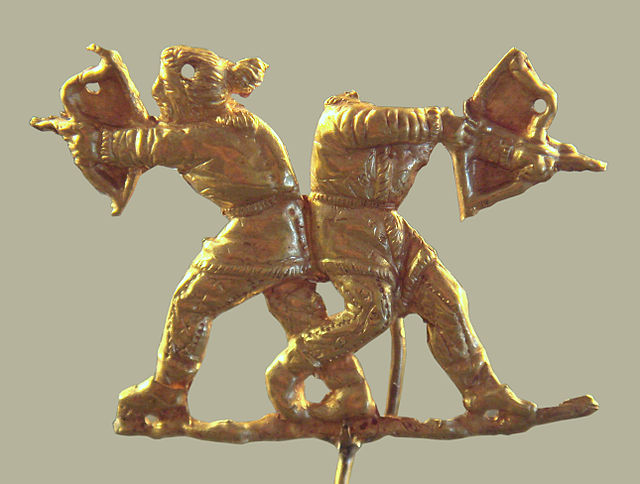Pantikapaion
Ancient Greek city in Crimea From Wikipedia, the free encyclopedia
Ancient Greek city in Crimea From Wikipedia, the free encyclopedia
Pantikapaion (‹See Tfd›Greek: Παντικάπαιον Pantikapaion, from Scythian *Pantikapa 'fish-path';[1] Latin: Panticapaeum) was an ancient Greek city on the eastern shore of Crimea, which the Greeks called Taurica. The city lay on the western side of the Cimmerian Bosporus, and was founded by Milesians in the late 7th or early 6th century BC, on a hill later named Mount Mithridat. Its ruins now lie in the modern city of Kerch.
Παντικάπαιον (in Ancient Greek) | |
 The prytaneion of Pantikapaion, second century BC. Kerch's Obelisk of Glory is visible in the background. | |
| Location | Kerch, Autonomous Republic of Crimea |
|---|---|
| Region | Taurica |
| Coordinates | 45°21′3″N 36°28′7″E |
| Type | Settlement |
| Area | 100 ha (250 acres) |
| History | |
| Builder | Settlers from Miletus |
| Founded | 7th or 6th century BC |
| Abandoned | Approximately 370 AD |
| Periods | Archaic Greek |
| Cultures | Greek |
| Site notes | |
| Condition | Ruined |
| Ownership | Public |
| Public access | Yes |

During the first centuries of the city's existence, imported Greek articles predominated: pottery (see Kerch Style), terracottas, and metal objects, probably from workshops in Rhodes, Corinth, Samos, and Athens. Local production, imitated from the models, was carried on at the same time. Athens manufactured a special type of bowl for the city, known as Kerch ware. Local potters imitated the Hellenistic bowls known as the Gnathia style as well as relief wares—Megarian bowls. The city minted silver coins from the 5th century BC and gold and bronze coins from the 4th century BC.[2] At its greatest extent it occupied 100 hectares (250 acres).[3] The Hermitage and Kerch Museums contain material from the site, which is still being excavated.

In the 5th–4th centuries BC, the city became the residence first of the Archaeanactids and then of the Spartocids, dynasties of Thracian kings of Bosporus, and was hence itself sometimes called Bosporus. Its economic decline in the 4th–3rd centuries BC was the result of the Sarmatian conquest of the steppes and the growing competition of Egyptian grain.
This section may contain material not related to the topic of the article. (November 2019) |

The last of the Spartocids, Paerisades V, apparently left his realm to Mithridates VI Eupator, king of Pontus. This transition was arranged by one of Mithridates's generals, Diophantus, who earlier had been sent to Taurica to help local Greek cities against Palacus of the Scythian kingdom in Crimea. The mission did not go smoothly: Paerisades was murdered by Scythians led by Saumacus, and Diophantus escaped to return later with reinforcements to suppress the revolt (c. 110 BC).
Half of a century later, Mithridates took his life in Pantikapaion, when, after his defeat in a war against Rome, his son and heir Pharnaces and citizens of Pantikapaion turned against him.
Seamless Wikipedia browsing. On steroids.
Every time you click a link to Wikipedia, Wiktionary or Wikiquote in your browser's search results, it will show the modern Wikiwand interface.
Wikiwand extension is a five stars, simple, with minimum permission required to keep your browsing private, safe and transparent.